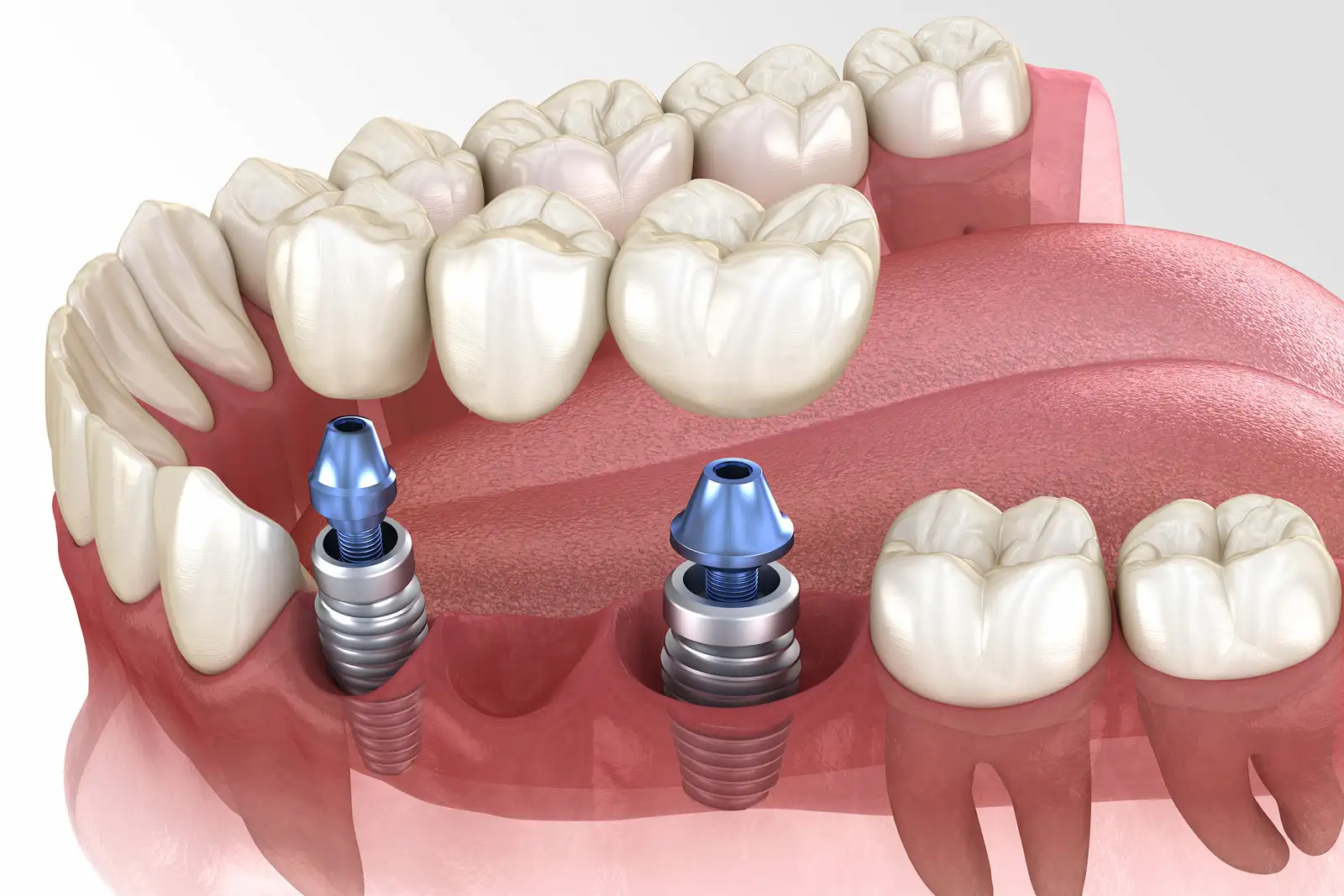Bridge on implants
For individuals who have lost several teeth in a row and wish to permanently replace the entire tooth structure to restore both aesthetics and functionality, installing a bridge on implants reduces the need for individual implants for each missing tooth, thus optimizing the rehabilitation process.

What is a bridge on implants?
A bridge on implants provides a strong bite, comfort while speaking and chewing, and a natural appearance, thanks to dental implants that replace the tooth roots and provide stable support for a dental bridge consisting of 2 to 3 connected crowns.
The advantage of this solution lies in its durability, preservation of the health of remaining teeth and jawbone, and the aesthetics that perfectly mimic natural teeth. After implant placement, a temporary dental bridge is installed, followed by a 3–6 month healing period for osseointegration (the process of the implant fusing with the bone).
The permanent bridge is fabricated in a dental laboratory from the chosen material (metal-ceramic, zirconia-ceramic) and is installed during the patient’s final visit. It can be fixed with screws or cemented, depending on the treatment plan and patient’s preferences.
Benefits of a dental bridge on implants
- Stability and strength – Secure bite without shifting
- Natural aesthetics – Appearance similar to natural teeth
- Bone preservation – Prevents jawbone recession
- Durability – Lasts many years with proper care
- Comfort and functionality – No need for adhesives or removal
Who are candidates for a bridge on implants?
A bridge on implants is an ideal solution for patients who:
- Have two or three consecutive missing teeth
- Have enough jawbone for implant placement
- Want a fixed and permanent solution without shifting
- Want a long-lasting and stable solution without the need to grind natural teeth
Patients with insufficient bone can still be candidates for this procedure after bone augmentation or sinus lift if necessary.
Procedure for implant bridge placement
Placing a bridge on implants involves several visits and takes 3 to 6 months.
1. First visit
Examination and treatment planning
- Clinical examination and oral health analysis
- X-ray or 3D CBCT imaging to assess bone condition
- Creation of a personalized treatment plan
Implant placement
- Two implants are placed under local anesthesia or sedation
- The gum is stitched, and the patient receives postoperative care instructions for the osseointegration process
- A temporary prosthetic restoration is made for the patient
2. Second visit – Placement of the abutment
- After the implants have fused with the bone, the abutment (support structure) is placed
- Precise impressions of the jaw are taken for the fabrication of the dental bridge
3. Third visit – Fabrication and placement of the permanent bridge
- The permanent bridge is secured with screws or cemented onto the implants
- Bite and aesthetics are checked
- The patient receives instructions on proper maintenance
A bridge on implants is a long-lasting, functional, and aesthetically acceptable solution for replacing missing teeth. It allows for even distribution of chewing forces and prevents bone loss.
Proper oral hygiene and regular check-ups are crucial for long-term success. With proper maintenance, a bridge on implants can last for decades, providing patients with improved quality of life.
Frequently asked questions about a dental bridge on implants
The entire process takes 3 to 6 months, including the time needed for osseointegration (the fusion of the implant with the jawbone).
No, the procedure is performed under local anesthesia, and post-procedural discomfort is minimal.
Usually, two implants are required to support a bridge with three connected crowns.
No, after implant placement, you must wait for osseointegration before the permanent dental bridge is placed. In the meantime, a temporary prosthetic restoration is provided.
With proper hygiene and regular check-ups, a bridge can last 20 years or more.
It is recommended to brush regularly, use interdental brushes, and attend regular dental check-ups.
A traditional bridge requires grinding of adjacent teeth, whereas a bridge on implants does not damage natural teeth.
Bone augmentation or sinus lift can be performed to ensure there is enough bone volume for implants.
If properly placed and with good hygiene, the risk of a bridge falling out is minimal.
It is recommended to have check-up appointments every 6 months to monitor implant stability and overall oral health.
Contact us
Our friendly team will be happy to listen to your requests.
